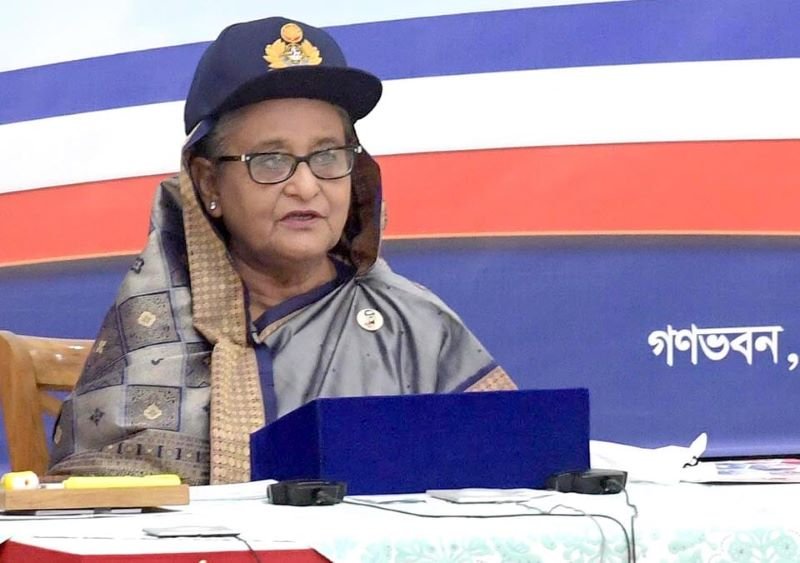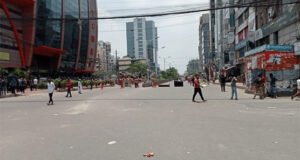
Prime Minister Sheikh Hasina on Wednesday said Bangladesh Coast Guard will be developed as a modern and time-fitting force to carry out its growing responsibility.
“Our (its) responsibility will go up in future. Keeping eyes on it, we’ve our own thoughts that we’ll build this Coast Guard as a modern and time-befitting,” she said.
The premier was addressing the commissioning ceremony of five locally made state-of-the-art vessels of Bangladesh Coast Guard (BCG) at BCG Patenga Berth in Chattogram through a videoconferencing from her official residence Ganabhaban here in the capital.
The five commissioned vessels are two inshore patrol vessels named ‘BCGS Apurba Bangla’ and ‘BCGS Joy Bangla,’ two tugboats named ‘BCGT Pratyay’ and ‘BCGT Pramatta’ and a floating crane named ‘BCGFC Shakti.’
The two inshore patrol vessels were built by state-owned Dockyard and Engineering Works Limited in Narayanganj, while two tugboats and the floating crane were made by the Khulna Shipyard.
Hasina said her government added 154 modern and faster ships and vessels of various sizes to the Coast Guard fleet in the last 14 years since 2009.
Besides, 4 offshore patrol vessels (OPVs), and 10-meter and 20-meter modern rescue boats from Japan were added to the BCG fleet, she said, adding that a dockyard is also being constructed at Ghazaria for the construction, repair and maintenance of Coast Guard ships and vessels.
“Bangladesh Coast Guard will rise to a new level of self-sufficiency or capability if ships are built at its own yard,” she said.
The PM said an initiative has been taken to install the digital connectivity between the Coast Guard and Bangabandhu Satellite-1 aiming to bring a revolutionary change in the BCG communication system in the deep sea for national interest and security, and safety of people’s life and property.
Besides, drone technology has been added to Bangladesh Coast Guard to ensure the security to the forcibly displaced Myanmar nationals in Bhasanchar, she said.
Noting that there is a huge potential of the country’s blue economy, Hasina said Bangladesh needs to utilize its sea resources and ensure security to the marine resources.
So, the government has taken a plan to strengthen this force further by adding two more all-weather and deep-sea Offshore Patrol Vessels (OPVs), a hospital ship, a hovercraft and several high-speed vessels within the 2026-2030 period, she said.
“The Coast Guard will have sufficient manpower and will be a mature, sophisticated and exemplary smart force from 2031 to 2041,” she added.
The PM asked all the members of Bangladesh Coast Guard to uphold the image and dignity of their force by bearing the spirit of patriotism and performing their duty with honesty and integrity.
Director General of Bangladesh Coast Guard Rear Admiral Ashraful Hoq Chowdhury, on behalf of the PM, handed over the commissioning forman (order) to the commissioning commanders of the five new vessels.
The premier unveiled the name plates of the new vessels added to the BCG fleet. The commissioning parade of the newly commissioned vessels took place.
Home Minister Asaduzzaman Khan and Senior Secretary of Public Security Division Mustafizur Rahman spoke at the commissioning ceremony, while BCG Director General Rear Admiral Ashraful Hoq Chowdhury delivered the welcome speech.
The new vessels are equipped with ultramodern machinery, sensors and surveillance radar. The inshore patrol vessels have three automatic cannons, which will play a vital role in protecting ourselves and running operational activities.
The vessels have surveillance capacity of 96 nautical miles and the cannons’ range is 4 kilometers and the ships are able to identify anything like other vessels, criminals or enemies within this range while the cannons will help the BCG conduct operational activities smoothly.
With the commission of the vessels, the operational activities of the BCG is expected to accelerate along with increase in the capacity to prevent stealing at commercial ships at the outer anchor, control human and drug trafficking through sea, patrol along the blue economy borders and conduct rescue operations in case of natural calamity and maritime accidents.
 Weekly Bangla Mirror | Bangla Mirror, Bangladeshi news in UK, bangla mirror news
Weekly Bangla Mirror | Bangla Mirror, Bangladeshi news in UK, bangla mirror news







